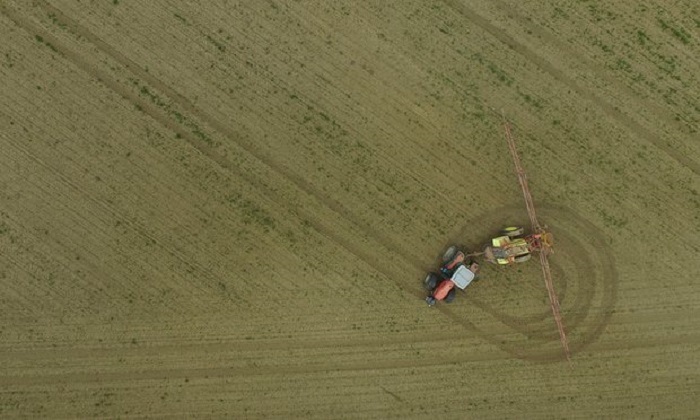Monsanto weedkiller faces recall from Europe`s shops after EU fail to agree deal

EU officials say that while there could be a voluntary grace period of six-12 months, unless a compromise can be found, the product’s license will be allowed to expire on 30 June.
One told the Guardian that after its proposal to cutting the authorisation to nine years was rejected, the bloc was now in “uncharted territory” with no clear path to a deal that could reach consensus.
“Our position is clear,” he said. “If we can reach a qualified majority on a text we will go ahead. Otherwise, we have to leave the authorisation to expire and on 30 June member states will need to start withdrawing products containing glyphosate from the market.”
Glyphosate is Europe’s most widely used weedkiller, and its parent RoundUp herbicide accounts for a third of Monsanto’s total earnings.
The compound is routinely – but not exclusively – used on crops that have been genetically engineered to resist it. Several studies have linked blanket spraying with damage to surrounding flora, fauna and the entire food chain.
But the commission moved to relicense it last November, after a crucial European food safety authority (Efsa) report declared it unlikely to cause cancer, although that paper sparked controversy.
Philip Miller, Monsanto’s vice president of global regulatory affairs, condemned the EU’s failure to reapprove glyphosate as “scientifically unwarranted” and “an unprecedented deviation from the EU’s legislative framework”.
Writing in a blog post, he said: “This delay undermines the credibility of the European regulatory process and threatens to put European farmers and the European agriculture and chemical industries at a competitive disadvantage.”
Richard Garnett, the head of Monsanto’s regulatory affairs unit said that the situation was “discriminatory, disproportionate and wholly unjustified”. The US agri-giant is currently the subject of a takeover bid by the German chemicals multinational, Bayer.
Under bloc rules, the commission could now go to an appeals committee but this would have the same balance of countries as the standing committee that has now twice failed to take a decision.
It could also go over the heads of the EU states and independently reauthorise glyphosate as a draft measure. The EU president Jean-Claude Juncker has said that he opposes doing this and officials doubt it will happen, although the procedure has been used to approve GM crops for import. A short-term license might also be possible.
Glyphosate is so ubiquitous that its residues are commonly found in breads, beers and human bodies. More than 99% of people in one recent German survey were found to have traces of the compound in their urine, 75% of them at levels five times the safe limit for water or above.
But the very definition of a safe limit for chemicals such as glyphosate is contested, and linked to a broader regulatory divide between the US’s risk-based approach which errs towards product approvals where doubt cannot be quantified, and the EU’s hazard-based approach, which leans towards a precautionary principle in such situations.
Dr Paul Neve, a weed biologist at Rothamsted Research, argued that glyphosate was a critical component of current crop protection strategies. “Decisions on future glyphosate registration have to take full account of the economic and environmental consequences across farms, both nationally and within the EU,” he said.
The National Farming Union’s vice president Guy Smith added: “It is essential that farmers and the environment are given every chance to thrive and I very much urge member state experts to listen to the scientific advice, and re-authorise glyphosate.”
However, after 1.4 million people signed a petition calling for glyphosate to be banned, campaign groups welcomed today’s vote as a sign that citizen concerns were being listened to.
Pascal Vollenweider, the campaign director of Avaaz, which organised the poll, said: “Governments are beginning to understand that their citizens refuse to be treated as lab rats. Monsanto and other chemical giants are used to getting their way, but public pressure has forced politicians to stand firm behind the precautionary principle.”
In the EU standing committee which failed to take a decision today, the UK strongly backed a new license for glyphosate. Germany abstained, along with Sweden and Italy. Opposition to the relicensing is thought to have been led by France, which has banned the substance.















































